Table of Contents Show
You probably won’t be surprised to learn that most RV fires occur around dinner time. The stove is lit, and the grill is on, so it makes sense that this period would lead to the highest incidents.
But in Portland, Oregon, three RVs caught fire in the morning hours, one of the least likely times for such an incident.
Although we don’t know much about what happened with these RVs, we know that RV fires are dangerous and deadly. Today, we’re looking closer at fire safety and providing a few tips to prevent a disaster from happening to you.
Let’s dive in!
Is RVing Dangerous?
RVing isn’t any more dangerous than any other outdoor hobby. The biggest danger is driving on the road since there are over two million car accidents yearly in the United States. But if you’re enjoying a weekend camping trip, there’s no need to worry about any danger.
There are, however, specific hazards you should be aware of to reduce your risk of fire, theft, carbon monoxide poisoning, and other health problems.
For example, leaving your bicycles outside at night may not be smart. Anyone could come by and steal one. Instead, lock them up to deter theft.
If you smell a gas leak, turn off the stove, open the windows, and go outside to get some fresh air. All RVers should be prepared for potential problems and know how to handle certain situations. But we should also take preventative action to reduce our risks of getting into danger.
Do RVs Catch on Fire?
One potential hazard that all RVers should understand is fire. Like kids undergo fire drills at school, local fire stations host awareness challenges, and families practice stop, drop, and roll reactions, RVers should know what to do if their RV catches fire.
Although this is rare, it’s not unheard of. And because RVs are constructed with so much wood, they’ll quickly burn in minutes.
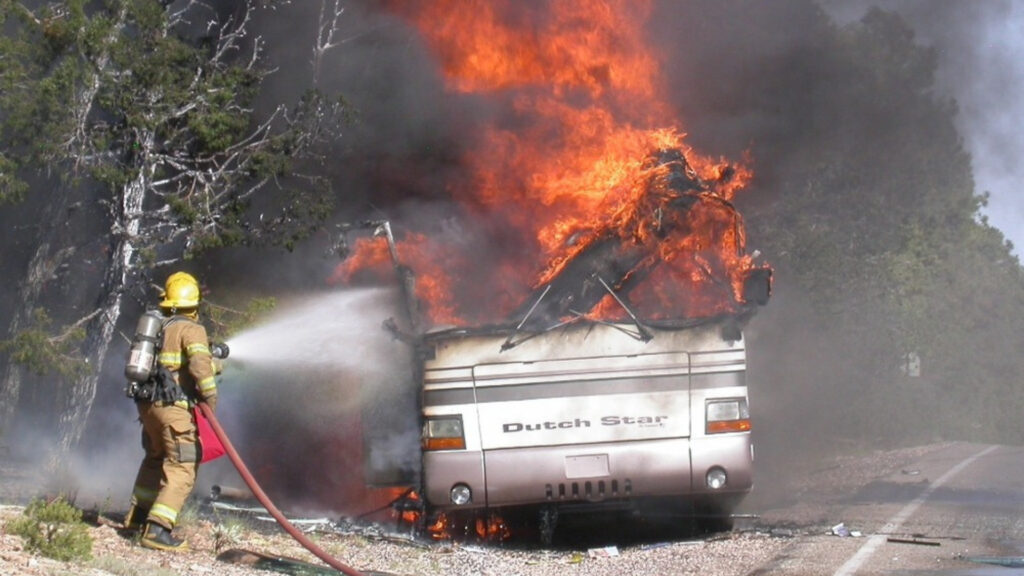
3 RVs Caught Fire in Portland, Oregon
In September, three RVs caught fire in Portland, Oregon, within an hour. KOIN News reported that fire crews responded to three separate fires between 7:00 and 8:00 a.m. on Thursday, September 7, 2023. All three fires were quickly extinguished and are still under investigation.
Let’s look at what types of RVs are most at risk and some potential hazards you should be aware of to keep you from making the morning headlines.
Which RVs Are Most at Risk for Fire?
An RV isn’t going to survive a fire. It’s not a sticks-and-bricks structure. The entire rig will burn in a matter of minutes. So, everyone must know what to do to escape safely. If you have kids, ensure they know how to use the emergency window. If you have pets, have a plan to get them out safely.
Older RVs tend to be more at risk of fire because they have less advanced fire safety measures, older engines, and older wiring. Of the 1,920 RV fires reported between 2008 and 2017, 84% didn’t have smoke alarms. Twenty of the 24 deaths related to these fires occurred in RVs without a smoke alarm.
Furthermore, 32% of these RV fires started in either the vehicle engine area or kitchen. This reflects the data that older engines and appliances with aged wiring have a greater fire risk.
5 Potential RV Fire Hazards
Don’t let the statistics scare you. In fact, they should be encouraging. Over ten years, less than 2,000 RV fires were reported to the National Fire Protection Association. But we want you to stay safe while camping, so we have five potential hazards you’ll want to be aware of.
1. Faulty Electrical System
First, don’t overload your electrical outlets. If you use a space heater, don’t plug anything else into that outlet. Make sure these space heaters are also running on a low-wattage setting. Also, regularly inspect your wiring.
Rodents like to chew on these wires. Finally, check your outlets with a multimeter every month or so. It’s an inexpensive tool that every RVer should have.
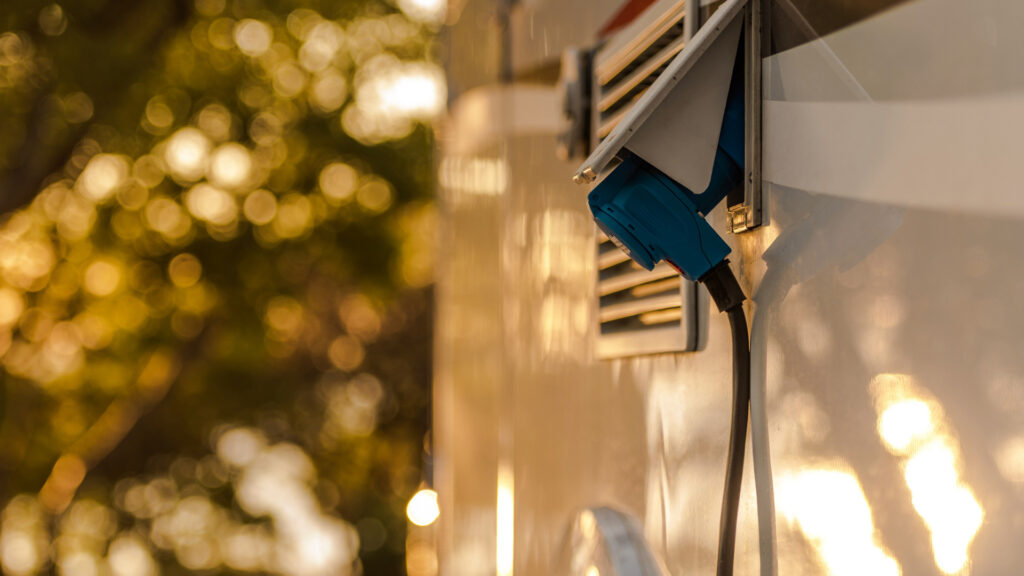
2. Propane Leaks
Another potential fire hazard is a propane leak. Propane is highly flammable. The most common components in your RV can be powered by propane — the stove, the refrigerator, and the propane leak detector.
It will shut down the flow as soon as it senses a propane leak. If you ever smell rotten eggs, you likely have a propane leak and must get out of the RV quickly.
Finally, never drive with your propane tanks turned on. If you get into an accident or a small spark occurs near the tanks, your RV will be engulfed in flames.
Pro Tip: An RV propane detector is essential! Keep you and your family safe with some of the best RV propane detectors.
3. Overheating Brakes
Although overheating brakes typically happen in motorhomes, this can also occur in towable RVs because trailers have their own brakes. When the brakes get hot, they can ignite a fire and burn any materials around them.
Don’t apply continuous brake pressure if you travel along a steep grade. Instead, downshift to navigate mountain passes. Take advantage of pull-outs to let your brakes rest.
4. Overcrowded Cooktop
Many RVs have a stove. But few RVs have ample countertop space. Problems arise when RVers put too many things around the cooktop.
There may be dish towels, utensils, paper plates, or other items near the stove. You can quickly start a fire if you don’t move everything out of the way before lighting the burner.
5. Cooking Outdoors Too Close to RV
Finally, RVers love to cook outside. It’s an ideal way to keep the interior cool and moisture-free. However, setting up your grill too close to the RV can lead to disaster. Cooking should be done at least 12 feet from the RV.
If you cook over a campfire, extend your range to at least 25 feet from your home on wheels.
Keep in Mind: Be prepared for any disaster while on the road with these practical RV safety products!
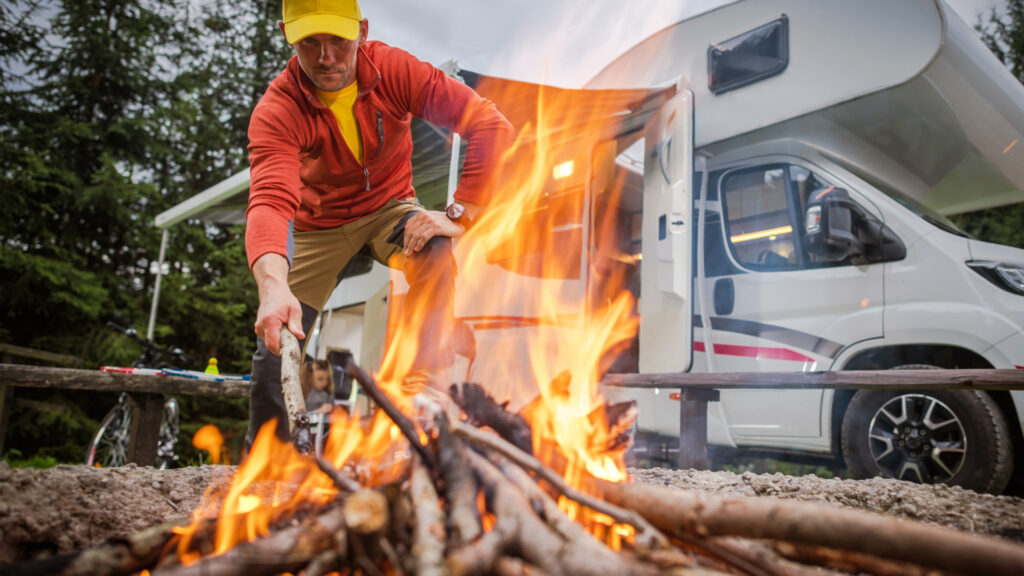
Should an RV Have a Fire Extinguisher?
If you have a small RV, you can get by with one fire extinguisher. But for RVers who travel in large motorhomes, toy haulers, or fifth wheels, you should have a fire extinguisher in every room.
Manufacturers must put a fire extinguisher near the entry door, but this won’t help if you have a fire in the garage of your toy hauler. Ensure you have adequate fire extinguishers should a fire occur in any part of your rig.
Do All RVs Have Smoke Detectors?
The National Fire Protection Association started requiring RVs to have smoke detectors in 1984. So, any RV built after that time will have a smoke alarm. However, because cooking inside can trigger the alarm, many RVers tend to remove it.
Please don’t do this. Smoke detectors save lives, and RVs can burn in minutes. Dealing with an annoying alarm is much better than losing your entire rig.
Stay Safe This Camping Season With Proper Fire Awareness
RVs aren’t indestructible. But there are certain precautions you can take to keep you and your family safe while camping. Just like you wouldn’t leave a stove unattended at home, don’t leave your stove unattended in your RV.
Just like you would check your house’s smoke alarms every month, check your RV’s smoke detector. Proper maintenance and care of your RV will go a long way to prevent disaster.
Are there any other tips you’d give RVers regarding fire safety?




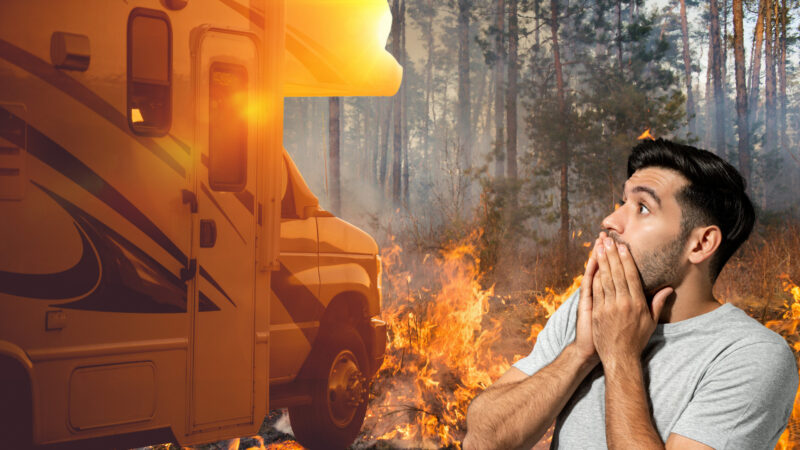

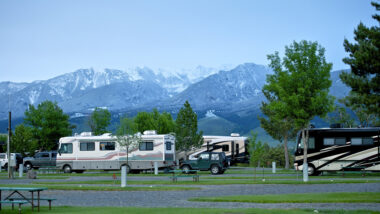
You mentioned that a grill should be 12 feet from the camper when cooking. My question is why do some campers have grills that are directly connected to the camper itself?